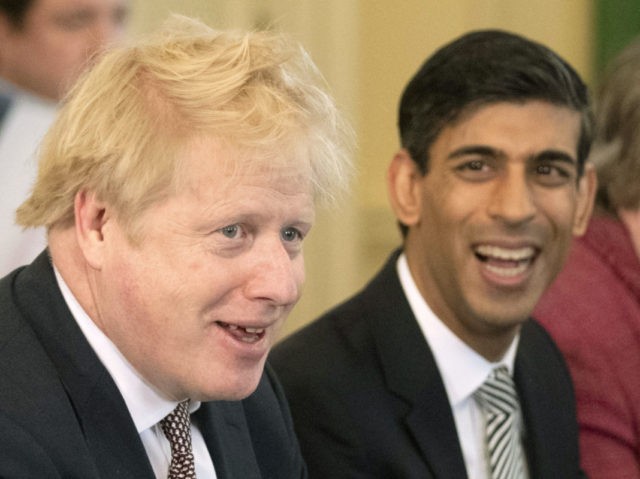To the surprise of literally no one whatsoever, Britain’s Chancellor Rishi Sunak has turned on the firehoses, maxed out on credit, and unleashed on the UK economy a public spending budget so profligate it would make a drunken sailor on shore leave blush.
OK now I'm getting a bit nervous. Can't add up all the money any more… #BudgetSpeech2020
— Merryn Somerset Webb (@MerrynSW) March 11, 2020
So… there is a Magic Money Tree, after all?#budget #MagicMoneyTree pic.twitter.com/KcSvI3VQF6
— John Sprackland (@johnsprackland) March 11, 2020
“Wages up, National Insurance cut, the Tampon Tax abolished, spirits duty frozen, beer duty frozen, wine and cider duty frozen, fuel duty, frozen. We promised to cut taxes and the cost of living and we got it done,” announced the Chancellor, and he talks a good game.
But then, you can talk a good game when you’re chucking vast wodges of other people’s money at everyone’s favourite pet causes.
For example, I must admit, I’m personally quite delighted at the millions have been allocated for potholes — which, as anyone who drives a car (ie most of us) could tell you is a problem that has been woefully neglected over the years.
I’m also very pleased that more money is going to be spent on road-building: roads equal freedom — the kind of thing any Conservative government ought to be backing, as opposed to pointless, wasteful white elephant projects like HS2.
And, while we’re temporarily in praise mode, I would also like to congratulate the Chancellor on his nimble response to the backlash which greeted his proposed green budget. At the weekend he was boasting about Net Zero — and got badly burned on Twitter.
But in this budget, there was scarcely a mention of green issues – which has annoyed all the right people.
A hugely disappointing #Budget2020 which
🌍barely acknowledges the #ClimateEmergency
🚗spends 20x as much on new roads as green transport
📉falls well short on green infrastructure neededThis Chancellor is *not* getting climate & environment “done” pic.twitter.com/oSu1o6pNTx
— Caroline Lucas (@CarolineLucas) March 11, 2020
Let’s not allow ourselves to be distracted though by all the smoke and mirrors — the much-vaunted removal of the tampon tax (yay!) or the £30 billion splurge on Coronavirus (sensible, if what I suspect is coming does come; but if you wanted to be cynical you could also note that this pandemic is providing handy cover for the budget’s excess). This was not remotely a Conservative budget. It was the kind of tax and spend profligacy you would expect of a Labour government.
As Margaret Thatcher once famously said: “The trouble with socialism is that eventually, you run out of other people’s money.”
This is not its own money that the government is splurging: it is taxpayers’ money, it is savers’ money, and it is the money of all those future generations who will inevitably be poorer because of the increased debt the government will now accumulate on our behalf.
If you believe in the Keynesian deficit spending fairy — as all socialists and most conservatives these days do — then there’s nothing to worry about.
But I’m with the Adam Smith Institute’s Matthew Lesh on this.
He says:
It is seriously concerning that the Government is looking at ripping up the fiscal rules. A Conservative Government should not implement debunked Keynesian stimulus theories. Some infrastructure and public services spending, as well as supporting individuals and businesses during Covid-19, is necessary.
But in the longer-run, spending like a drunken sailor will not create a thriving entrepreneurial economy. Expansive vanity projects won’t make us better off. Bureaucrats picking winners does not support risk-taking by entrepreneurs — the Government should be cutting red tape on innovation like limits on biotechnology, not presuming to know what is best.
Also, as economist Ruth Lea told Breitbart last year, with the economy at near full employment increased government spending will not so much create economic growth as it will drive up the price of labour. This will make it harder for private entrepreneurs — the engine room of the economy, our best hope for a prosperous Brexit future — to find good staff or compete internationally. Instead, all that talent will be hoovered up on government infrastructure boondoggles which may — or more likely may not — be what the country needs.
This is not what a Conservative government looks like – or at least not what one should look like. If the size of the state, the public sector, grows bigger then the private sector will relatively become smaller.
If you had a choice between, say, indulging Boris Johnson’s self-aggrandising predilection for grands projets — such as HS2 or his lunatic proposed tunnel to Ireland — or having more of your own money to spend on things you actually wanted, which would you choose?

COMMENTS
Please let us know if you're having issues with commenting.